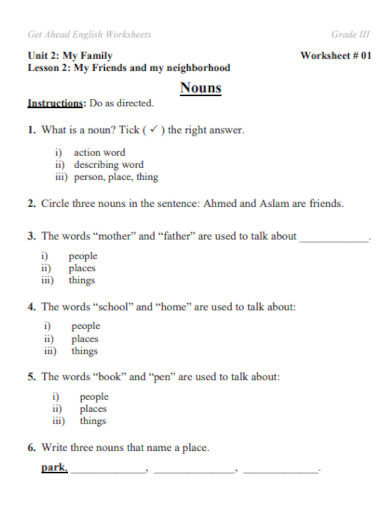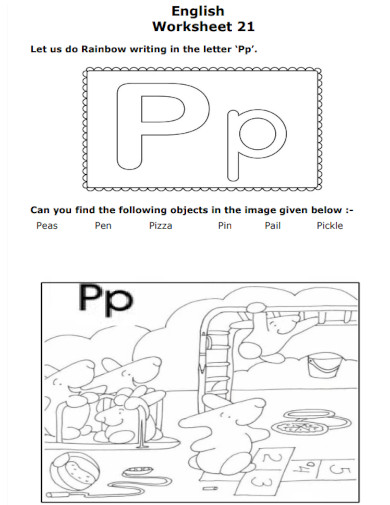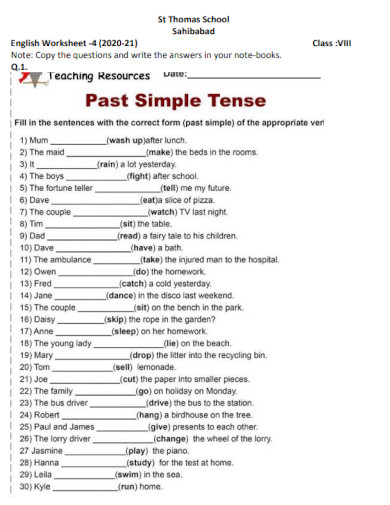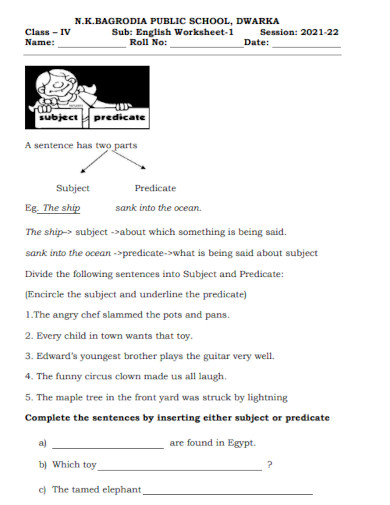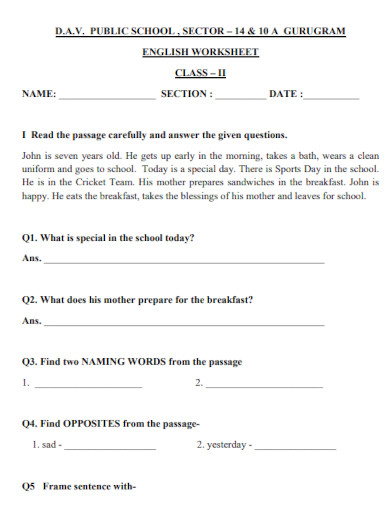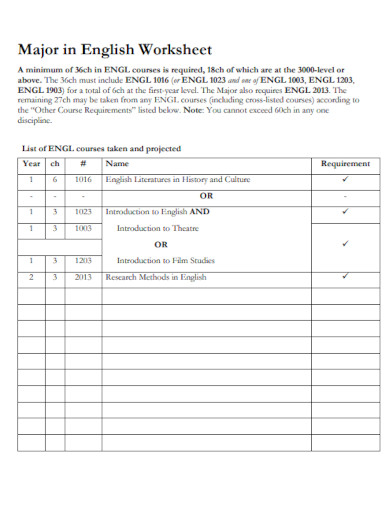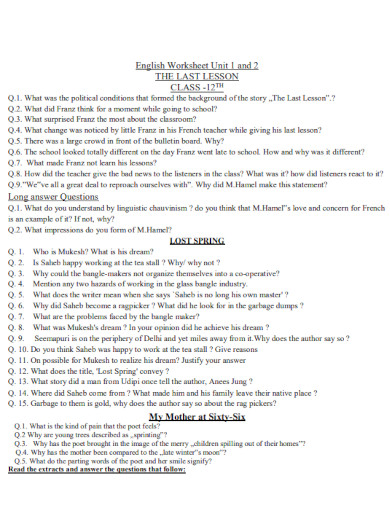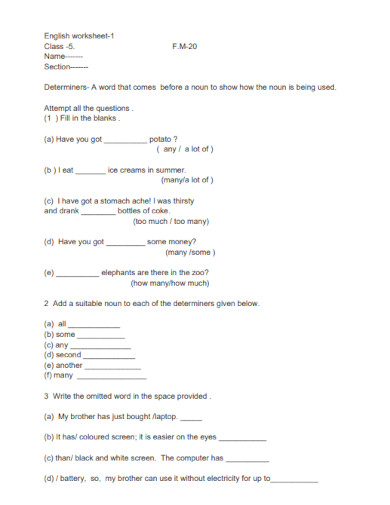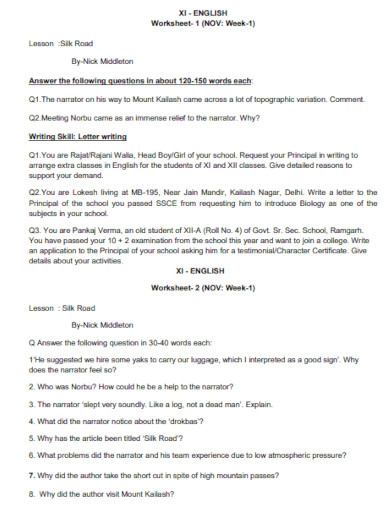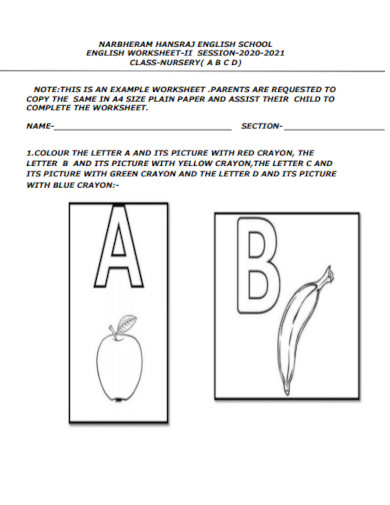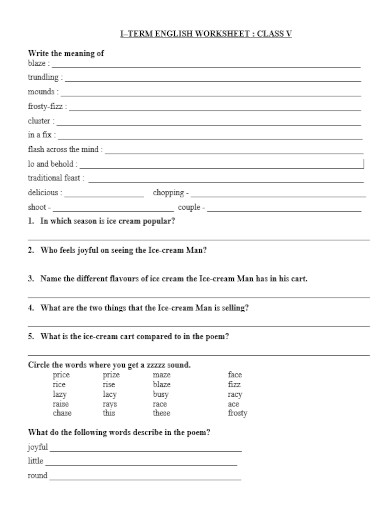Teaching beginners can be a daunting prospect, especially when it’s a monolingual group and you know nothing of their language, or it’s a multilingual group and the only common language is the English you’ve been tasked with teaching them. Nevertheless, not only is it possible to teach beginners only through English, but it can also be one of the most rewarding levels to teach. To help you succeed in setting your learners firmly on the path to increasing proficiency, here are seven tips for teaching English to beginners.
10+ English Worksheet Samples
1. 3rd Grade English Worksheet
2. English Worksheet for Kids
3. Standard English Worksheet
4. English Worksheets for Schools
5. Basic English Worksheet
6. Major in English Worksheet
7. English Worksheet Sample
8. English Worksheet for Class
9. Printable English Worksheet
10. English Worksheets Example
11. English Worksheet in DOC
List of English Grammar Lessons
2. Count Nouns vs. Non-Count Nouns
3. Possessive Nouns
4. Pronouns
5. ‘Be’ Verbs
6. Action Verbs
7. Adjectives
8. Comparative and Superlative Adjectives
9. Adverbs
10. Simple Tense
11. Progressive and Perfect Tense
12. Perfect Progressive Tense
13. Irregular Verbs
14. Gerunds
15. Infinitives
16. Active Voice and Passive Voice
18. Prepositions
19. Conjunctions
20. Articles
21. Interjections
22. Capitalization
How to Teach English to Beginners
1. Keep instructions clear and simple
It can be tempting when addressing a class of students, especially ones that you’ve only just met, to explain activities in your politest language. After all, no one likes to be rude. However, a student who has only a few words of English, if any at all, won’t appreciate the courtesy of (or even understand), “OK, so now what I’d like you all to do, if you don’t mind, is just to stand up for a moment and come to the front of the class. Oh, and please bring your book with you. Could we all just do that?”
Instead, make instructions crystal clear by using as few words as necessary and by gesturing whenever possible, and break down series of instructions into smaller units. If you want to be polite, “please” and “thank you” will do. “Everybody – take your book, please. Stand up. Now, come here, please. Thank you.”
2. Let them listen first
More than likely, your students will want to start practising speaking pretty much from the get-go. However, it takes a while for one’s ear to acclimatise to the sounds of a new language, and not everyone will be so keen; don’t pressure students into speaking before they’ve had lots of opportunity to listen to you using it (which doesn’t mean you should just be rambling on at the front of the classroom – with beginners more so than with other levels, you really have to consider what you say and grade your language accordingly).
3. Drill, repeat, drill, repeat, drill…
Beginners need lots of repetition and drilling, especially as they get to grips with the sounds of their new language. It might seem boring to go over the same sentences again and again, but it is necessary. When practising a new sentence, try back-drilling, breaking the sentence down into manageable units and then building it back up, working backwards from the end of the sentence to the beginning; this helps to ensure that your intonation is natural and that you get elements of connected speech right.
4. Establish classroom language early on
Classroom language – Can you speak more slowly? What do we have to do? I don’t understand. What does… mean? How do you say… in English? – is usually associated with teaching children, but it really helps with adult beginners as well. No matter how friendly and relaxed you make your classroom atmosphere, learning a new language can still be daunting, especially when you feel you’re not completely following what’s going on, or that you might be called on to say something that you don’t feel ready to say. It’s much better to equip students early on with classroom language that will help them navigate the lesson smoothly.
5. Avoid metalanguage
There’s no point in students knowing the terms past simple, irregular verb or adverb of frequency if they can’t use the actual structures or words they refer to. Don’t tell them how to say something: show them. Give as much context as you can (visual prompts work well). Furthermore, make sure you check they have understood by asking questions that test their comprehension – never ask “Do you understand?” as a) many people are reluctant to let on that they haven’t understood and will pretend instead that they have; and b) a student may think they have understood when in fact they haven’t.
FAQs
What is the point of English lessons?
English class is important because it helps develop linguistic skills. It also helps students improve reading comprehension and speaking skills. Furthermore, it teaches students about the nuances of language and how to use language appropriately. English courses can be helpful for improving your fluency in speaking, polishing your writing skills and targeting specific skills you need for a particular social or professional environment. Such courses can also be enjoyable and enriching.
What knowledge can you gain from English?
Written and oral communication skills – ability to define audience, construct an argument, present an idea, and provide background information on a variety of issues.
Even after you’ve given great instructions, shown a picture, and done an Oscar-worthy mime, you’ll still sometimes end up with a class of clueless faces looking back at you. When teaching basic English to beginners, it can be hard to gauge how much students understand. And often, through no fault of their own, they may completely misunderstand what you’re asking them. To help everyone stay on track, you’ll need to check students’ understanding all the time. To do this, ask concept check questions. To help you get started making the worksheet, download our free sample templates above to use as your guide!
Related Posts
FREE 8+ Parts of a Business Letter Templates
FREE 8+Presentation Evaluation Forms
FREE 7+ Sample International Phonetic Alphabet Chart Templates ...
FREE 7+ Self Introduction Speech Examples
FREE 7+ Sample Tutor Resume Templates
FREE 5+ Sample Graduation Speech
FREE 5+ Discursive Writing Samples
FREE 42 Teacher Resume Templates
FREE 10+ Tutor Lesson Plan Samples
FREE 5+ Sample Phonetic Alphabet Chart Templates
FREE 7+ Commentary Writing Samples
FREE 7+ Sample Business Agreement between Two Parties
FREE 7+ Sample Letter of Recommendation for Teacher
FREE 7+ Sample News Report Templates
FREE 6+ Sample Teacher Recommendation Letter Templates

